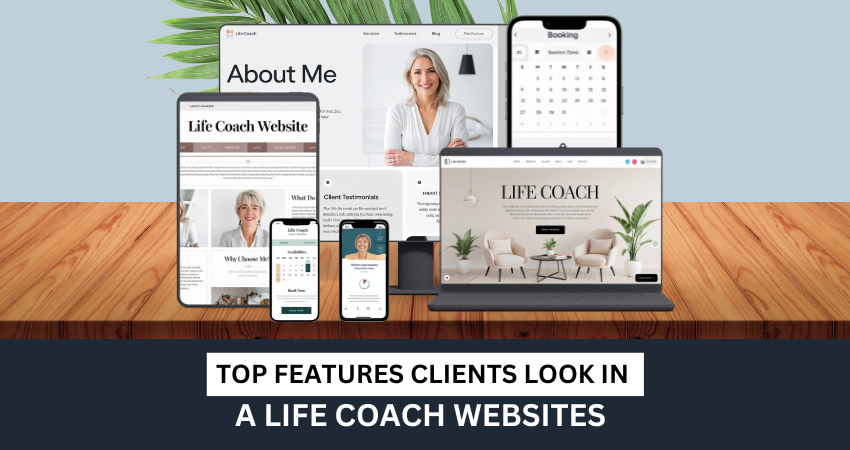
When potential clients visit a life coach's website, they are looking for certain key features that build trust, provide value, and simplify the booking process. If your website lacks these essentials, you might miss out on turning visitors into clients. Here are the top features every life coach website should have:
We all know how important first impressions are. When someone lands on your website, the visual design, layout, and structure speak volumes within seconds. A clean, modern, and professional-looking website instantly reassures visitors that you take your work seriously. It tells them you care about every detail, and this care will likely translate into your coaching services.
But it’s more than just professionalism—they want to feel something. Your website should evoke the same emotions you tap into during your coaching sessions: hope, empowerment, and clarity. If your website feels cluttered or dated, it can create a sense of confusion, which is the last thing a potential client wants.
People want to work with life coaches they feel connected to. When a client visits your website, they’re not just looking for a service, they’re looking for someone who gets them. This is where a well-crafted "About" page comes into play. Clients want to know your story, what drives you, and how you can help them achieve their goals.
Share your journey, your passion for helping others, and even your own struggles—this makes you relatable. A powerful "About" page doesn’t just list qualifications; it tells a story that resonates and builds trust.
Have you ever visited a website that feels like a maze? Frustrating, right? Your potential clients feel the same when they can’t easily find what they’re looking for. A clear and simple navigation menu is crucial. Clients should be able to locate your services, read your blog, or book a session without digging through endless links.
Also, keep in mind that many people will be accessing your site from their phones. If your website isn’t mobile-friendly, you're likely losing clients before they’ve had a chance to get to know you. Responsive design ensures your site looks and functions well on all devices, which is vital for building credibility.
Testimonials act like a spotlight on your work. When potential clients see others who’ve benefited from your coaching, it gives them confidence that you can help them too. But it’s not just about slapping quotes on your homepage. Success stories should be authentic, specific, and varied.
Consider including detailed case studies or video testimonials that show real transformations. Seeing is believing, and when clients can hear or read about someone else’s success, it nudges them closer to booking that first session.
The more specific you are about what you offer, the better. Clients need to clearly understand what types of coaching you provide, whether it's career coaching, relationship guidance, or personal growth. Each service should have its own dedicated page with a detailed description.
People tend to avoid vague or generic websites. Show them exactly what you can do for them, how your coaching process works, and what kind of results they can expect.
We live in a time where convenience is key. If clients can’t easily book a session online, they may lose interest. A user-friendly booking system allows clients to see your availability, choose a time that works for them, and even pay for the session without the hassle of back-and-forth emails.
Think of this as a crucial step in the client journey. The easier it is to book a session, the higher your conversion rate will be.
Blogs aren't just for SEO; they are a direct way to offer value to your visitors. When clients see you regularly sharing insightful, relevant content, they begin to see you as an authority in the life coaching space.
Plus, your blog is a place where you can answer common questions, share tips, and address the real-life challenges your audience is facing. It’s an opportunity to build a deeper connection before they’ve even booked a session.
Clients often have a ton of questions before committing to a coaching session. A well-thought-out FAQ section can ease their concerns. Whether they’re wondering about your coaching style, pricing, or what to expect in the first session, an FAQ page can address these issues upfront.
Answering their questions early can remove any roadblocks and help them feel more confident in taking the next step.
Life coaching often touches on deeply personal issues, so privacy is a top concern for many clients. Make sure your website clearly outlines your commitment to confidentiality. This can be as simple as having a visible privacy policy or mentioning it during the booking process. Clients want to know their information is safe with you.
How frustrating is it when you can’t find contact information on a website? Your contact details should be easily accessible—whether it's an email address, phone number, or a contact form.
Better yet, offer multiple ways for clients to reach you. Some may prefer a quick call, while others feel more comfortable sending an email. Being accessible is key to creating a welcoming atmosphere.
At Future Innovation LTD, we specialize in building life coach websites that attract and convert clients. From sleek designs and intuitive navigation to booking systems and SEO optimization, we ensure that your website reflects the value of your services. Whether you need help with a user-friendly booking system, writing compelling service descriptions, or ensuring seamless navigation, Future Innovation LTD is here to support your success. Let us help you create a professional and engaging online presence to grow your coaching business.
A well-designed website is essential for life coaches looking to attract and retain clients. By focusing on key life coach website features such as a clear homepage, easy navigation, and transparent pricing, you can create a compelling online presence that resonates with potential clients.